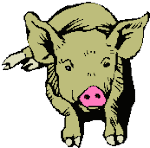Rates of MRSA in Swiss pigs are increasing, including ST49 for the first time.
But Britain continues to maintain its miraculous absence of MRSA of any kind in British pigs.
Even though the agricultural ministry has been forced belatedly, after nearly two years silence, to admit MRSA in the milk, but pigs? Never!
Aren’t we lucky fellows to have such marvellous veterinarians?
They are so good, they don’t even need to look.
And when they do find any, it will all be the fault of filthy foreigners and their filthy pork and happened last week.
It's always like that in Britain.
And everyone will pretend to believe them, as they line up to collect the gongs and sinecures given as a reward for loyalty to the vetocracy and a reminder to keep their mouths firmly shut.
Wake up England! Your veterinarians are endangering and disgracing you yet again.
Full report from 7thspace.com, here
Extracts:
The increase of methicillin-resistant Staphylococcus aureus (MRSA) and the presence of an unusual sequence type ST49 in slaughter pigs in Switzerland
In years past, methicillin-resistant S. aureus (MRSA) has been frequently detected in pigs in Europe, North America and Asia.
Recent, yet sporadic studies have revealed a low occurrence of MRSA in Switzerland. In 2009, a monitoring survey of the prevalence and genetic diversity of methicillin-resistant S.aureus (MRSA) in slaughter pigs in Switzerland was conducted using methods recommended by the EU guidelines, and using a sampling strategy evenly distributed throughout the year and representative of the Swiss slaughter pig population.
Recent, yet sporadic studies have revealed a low occurrence of MRSA in Switzerland. In 2009, a monitoring survey of the prevalence and genetic diversity of methicillin-resistant S.aureus (MRSA) in slaughter pigs in Switzerland was conducted using methods recommended by the EU guidelines, and using a sampling strategy evenly distributed throughout the year and representative of the Swiss slaughter pig population.
Monitoring should determine if the overall prevalence of MRSA in the entire country is increasing over the years and if specific multi-resistant MRSA clones are spreading over the country.
Results: In 2009, the nasal cavities of eight out of 405 randomly selected pigs were positive for MRSA, representing a prevalence of 2.0%...
Results: In 2009, the nasal cavities of eight out of 405 randomly selected pigs were positive for MRSA, representing a prevalence of 2.0%...
The following year, 23 out of 392 pigs were positive for MRSA 5.9%
Three multilocus sequence types (ST), four spa types and two types of staphylococcal cassette chromosome mec (SCCmec) elements were detected...
...Conclusions: This study is the first to describe the presence of MRSA ST49 in slaughter pigs, and to demonstrate a significant and nearly three-fold increase of MRSA prevalence in pigs within two years.
The presence of a specific clonal lineage of MRSA from Switzerland suggests that it has been selected in Swiss pig husbandry. Effective hygiene measures should be enhanced within the entire pig production chain to suppress the spread of these pathogens into the community.
Author: Gudrun OvereschSabina ButtnerAlexandra RossanoVincent Perreten
Credits/Source: BMC Veterinary Research 2011, 7:30
